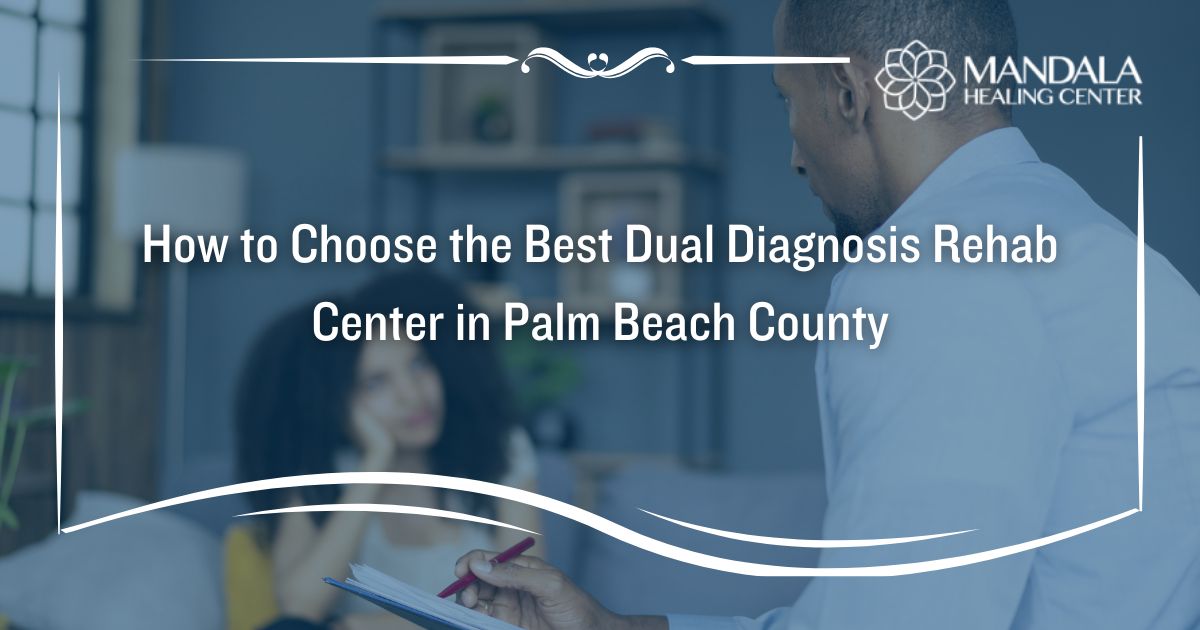Mental health and addiction often go hand in hand. When you have an untreated mental health condition, the symptoms can affect your daily life. This might lead you to begin numbing your symptoms with drugs and alcohol.
According to the National Alliance on Mental Illness (NAMI), “1 in 15 U.S. adults experienced both a substance use disorder and mental illness.”[1]
If you have a mental health condition and addiction at the same time, you have co-occurring disorders. Since the symptoms of co-occurring disorders can exacerbate each other, you need to receive treatment for them both at the same time. Thankfully, dual-diagnosis treatment programs were created exactly for this reason.
When picking a dual diagnosis rehab center in Palm Beach, you should look for one that offers individualized care, medical detox, evidence-based therapies, safe prescribing methods, and an adequate program length.
In this article, you will learn:
- What is a dual diagnosis treatment center?
- Why should mental health and addiction be treated at the same time?
- How can you choose the best dual diagnosis program in Palm Beach?
What is a Dual Diagnosis Rehab?
Dual-diagnosis rehabs provide mental health services and substance abuse treatment at the same time. They are usually inpatient programs, as co-occurring disorders require a high level of care. Dual diagnosis treatment may last anywhere from 30 to 90 days depending on your needs and the specific program you choose.
Dual-diagnosis treatment centers can address the following mental health issues:
- Anxiety disorders
- Depressive disorders
- Bipolar disorder
- Trauma-related disorders like PTSD
- Eating disorders
- Personality disorders
- Schizoaffective disorder and schizophrenia
- And more!
Any kind of mental health condition you are struggling with can be managed by a dual diagnosis program. You’ll receive individual therapy, group counseling, and medication to help you recover.
Dual diagnosis programs address addiction by providing medical detox, evidence-based therapies, and relapse prevention planning to help you develop the tools and skills you need to maintain long-term recovery.
Choosing Dual Diagnosis Treatment in Palm Beach County
Addiction and mental health can turn into a cycle of intense symptoms and substance abuse that is hard to break. Dual-diagnosis rehab programs provide the tools and support you need to overcome co-occurring disorders simultaneously.
When picking a dual-diagnosis addiction treatment center in Palm Beach, look for:
Individualized Care
While some behavioral health programs use a one-size-fits-all approach to treatment, dual-diagnosis rehab centers tend to focus on individualized care. You’ll receive a treatment plan solely based on your needs.
To create individualized treatment plans, the admissions counselors will provide you with an in-depth assessment. You will be asked questions about your physical and mental health as well as your history of substance abuse.
Medical Detox Services
A major part of treating addiction involves medical detox. When you are addicted to a substance, your brain and body become dependent on it. As a result, you’ll experience withdrawal symptoms when you stop using it.
Medical detox services provide you with FDA-approved medication to control withdrawal symptoms and prevent cravings. You’ll also receive 24/7 medical monitoring to ensure you remain safe and stable throughout the process.
Evidence-Based Therapies
When treating mental health and addiction, therapy is vital. Individual therapy and group counseling are used for both of your co-occurring disorders.
Therapy helps you recover from addiction by identifying the root causes of your substance abuse, causing positive behavioral changes, learning emotional regulation techniques, and teaching you healthy coping mechanisms. It also manages mental health conditions by using techniques to lessen the severity of your daily symptoms.
When treating co-occurring disorders, evidence-based therapies are used. Examples of evidence-based therapies for substance use disorders include cognitive behavioral therapy (CBT), motivational interviewing (MI), 12-step facilitation therapy, and more.[2]
The therapies used to manage your mental health condition depend on what disorder you struggle with. Personality disorders like borderline are mainly treated using dialectical behavior therapy (DBT), while post-traumatic stress disorder might be managed with eye movement desensitization and reprocessing (EMDR).
Safe Prescribing Methods
Many mental health conditions require daily medication to manage symptoms that are therapy-resistant. Most of the psychiatric medications you are prescribed will be non-habit-forming to ensure your substance use disorder is not triggered. That said, you still want to make sure the program is using safe prescribing methods.
Medical professionals use safe prescribing methods in dual diagnosis rehab programs by only giving you one dose at a time. You will also meet with your psychiatrist regularly to go over any side effects you are experiencing. Your dose will be adjusted depending on your needs and the progress you experience with symptoms.
Length of Program
Lastly, the National Institute on Drug Abuse (NIDA) reports that “participation for less than 90 days is of limited effectiveness, and treatment lasting significantly longer is recommended for maintaining positive outcomes.”[3]
In other words, addiction treatment usually requires 90 days or more to be effective. This means you’ll want to choose a program that offers a 90-day treatment plan, especially when you consider that you also have to recover from a mental health condition at the same time.
Get Connected to Dual Diagnosis Care in Palm Beach
If you or a loved one suffers from co-occurring disorders, it’s time to seek professional help. At the Mandala Healing Center, we offer an individualized and evidence-based approach to mental health and addiction treatment. In other words, we will provide you with all of the tools, support, and care you need to make a full recovery.
Contact us today to learn more about our highly-rated dual diagnosis rehab program in Palm Beach County.
References:
- The National Alliance on Mental Illness (NAMI): Mental Health by the Numbers
- Science Direct: Evidence-based practices for substance use disorders
- The National Institute on Drug Abuse (NIDA): Principles of Drug Addiction Treatment
















